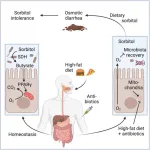Root microbes may be the secret to a better tasting cup of tea
2024-02-15
(Press-News.org) You’d think the complex flavor in a quality cup of tea would depend mainly on the tea varieties used to make it. But a study appearing in the journal Current Biology on February 15 shows that the making of a delicious cup of tea depends on another key ingredient: the collection of microbes found on tea roots. By altering that assemblage, the authors showed that they could make good-quality tea even better.
“Significant disparities in microbial communities, particularly nitrogen metabolism-related microorganisms, were identified in the roots of tea plants with varying qualities through microbiomics,” says Tongda Xu of Fujian Agriculture and Forestry University in Fujian, China. “Crucially, through the isolation and assembly of a synthetic microbial community from high-quality tea plant roots, we managed to notably enhance the amino acid content in various tea plant varieties, resulting in an improvement in tea quality.”
China harbors a wealth of genetic resources for growing tea plants. But, the researchers explain, improving the quality of tea through molecular genetic breeding methods is challenging. There’s interest in finding other ways to modify and enhance tea, perhaps including the use of microbial agents. Earlier studies showed that soil microbes living in plant roots affect the way nutrients are taken up and used within plants. In the new study, the researchers wanted to learn more about how specifically root microbes affect tea quality.
They found that the microbes in tea roots affected their uptake of ammonia, which in turn influenced the production of theanine, which is key for determining a tea’s taste. They also saw variations in the microbes colonizing different teas. By comparing tea varieties with different amounts of theanine, they identified a set of microbes that looked promising for altering nitrogen metabolism and boosting theanine levels.
They next constructed a synthetic microbial community, dubbed SynCom, that closely mirrored the one found in association with a high-theanine tea variety called Rougui. When they applied SynCom to tea roots, they found it boosted theanine levels. The microbes also allowed Arabidopsis thaliana, a plant commonly used in basic biological studies, to better tolerate low nitrogen conditions.
“The initial expectation for the synthetic microbial community derived from high-quality tea plant roots was to enhance the quality of low-quality tea plants,” says study co-author Wenxin Tang. “However, to our astonishment, we discovered that the synthetic microbial community not only enhances the quality of low-quality tea plants but also exerts a significant promoting effect on certain high-quality tea varieties. Furthermore, this effect is particularly pronounced in low-nitrogen soil conditions.”
The findings suggest that synthetically produced microbial communities could improve teas, especially when grown in nitrogen-deficient soil conditions, they say. Because tea trees require lots of nitrogen, the discovery could help to reduce the use of chemical fertilizers while promoting the quality of tea trees. The findings may have important implications for agricultural crops more broadly.
“Based on our current experimental findings, the inclusion of the SynCom21 microbial community has not only improved the absorption of ammonium nitrogen in different tea varieties but also enhanced the uptake of ammonium nitrogen in Arabidopsis thaliana,” Xu says. “This suggests that the ammonium nitrogen uptake-promoting function of SynCom21 may be applicable to various plants, including other crops.”
For instance, they say, it may allow for growing rice with improved qualities including greater protein content. They now plan to further optimize SynCom and assess its use in field trials. They also hope to learn more about how root microbes affect other secondary metabolites in tea trees.
###
This work was supported by Fujian Agriculture and Forestry University. The authors declare no competing interests.
Current Biology, Xin et al.: “Root microbiota of tea plants regulate nitrogen homeostasis and theanine synthesis to influence tea quality.” https://www.cell.com/current-biology/fulltext/S0960-9822(24)00079-4
Current Biology (@CurrentBiology), published by Cell Press, is a bimonthly journal that features papers across all areas of biology. Current Biology strives to foster communication across fields of biology, both by publishing important findings of general interest and through highly accessible front matter for non-specialists. Visit http://www.cell.com/current-biology. To receive Cell Press media alerts, contact press@cell.com.
END
[Attachments] See images for this press release:


ELSE PRESS RELEASES FROM THIS DATE:
2024-02-15
Cell Press, Cell Signaling Technology (CST), and the Elsevier Foundation are proud to announce the winners of the 4th annual Rising Black Scientists Awards: Jaye Wilson of Yale University, Kevin Brown Jr. of California State University San Marcos, Senegal Mabry of Cornell University, and Akorfa Dagadu of the Massachusetts Institute of Technology.
This year had the greatest number of submissions thus far, with the winners being selected from a pool of more than 350 applicants from across the life, health, physical, earth, environmental, and data sciences. Essays from the winners and honorees appear in the journals Cell and ...
2024-02-15
Researchers report February 15 in the journal Cell that ancient viruses may be to thank for myelin—and, by extension, our large, complex brains. The team found that a retrovirus-derived genetic element or “retrotransposon” is essential for myelin production in mammals, amphibians, and fish. The gene sequence, which they dubbed “RetroMyelin,” is likely a result of ancient viral infection, and comparisons of RetroMyelin in mammals, amphibians, and fish suggest that retroviral infection and genome-invasion ...
2024-02-15
Columbia researchers have found that a rare type of lipid is a key driver of ferroptosis, a form of cell death discovered by Columbia professor Brent Stockwell.
The findings provide new detail on how cells die during ferroptosis and could improve understanding of how to stop ferroptosis in contexts where it is harmfully occurring– in neurodegenerative diseases, for example– or induce it in contexts where it could be useful, such as using it to kill dangerous cancer cells.
The new research found that a rare type of ...
2024-02-15
The first accurate maps of outbreaks of potato blight — a disease caused by the fungus-like pathogen Phytophthora infestans that was responsible for the Irish potato famine between 1845 and 1852 — in the USA between 1843 and 1845 are presented in a study published in Scientific Reports. The findings improve our understanding of the spread of potato blight before the disease reached Europe.
Jean Ristaino and colleagues mapped outbreaks of potato blight in North America between 1843 and 1845 by analysing historic agricultural reports published in the USA during this period. The authors found that the disease was first reported ...
2024-02-15
An innovative treatment significantly increases the survival of people with malignant mesothelioma, a rare but rapidly fatal type of cancer with few effective treatment options, according to results from a clinical trial led by Queen Mary University of London.
The phase 3 clinical trial, led by Professor Peter Szlosarek at Queen Mary and sponsored by Polaris Pharmaceuticals, has unveiled a breakthrough in the treatment of malignant pleural mesothelioma (MPM), a rare and often rapidly fatal form ...
2024-02-15
About The Study: In this study of primary-care patients with obesity, all weight management treatments (nutrition counseling, very low-calorie meal replacement, anti-obesity medications, and bariatric surgery) increased the patient-level probability of achieving 5% or greater weight loss, but current rates of utilization are low and insufficient to reduce weight at the population level.
Authors: Dina H. Griauzde, M.D., M.Sc., of the University of Michigan in Ann Arbor, is the corresponding author.
To access the embargoed study: Visit our For The Media website at this link https://media.jamanetwork.com/
(doi:10.1001/jamanetworkopen.2023.56183)
Editor’s ...
2024-02-15
About The Study: Moderate or severe and penetrating traumatic brain injury (TBI) were associated with the subsequent development of brain cancer in this study of more than 1.9 million veterans of the Iraq and Afghanistan wars. However, mild TBI was not associated with later brain cancer diagnoses.
Authors: Ian J. Stewart, M.D., of the Uniformed Services University of Health Sciences in Bethesda, Maryland, is the corresponding author.
To access the embargoed study: Visit our For The Media website at this link https://media.jamanetwork.com/
(doi:10.1001/jamanetworkopen.2023.54588)
Editor’s ...
2024-02-15
North Carolina State University researchers used text analytics on both historic and modern writing to reveal more information about the effects and spread of the plant pathogen – now known as Phytophthora infestans – that caused the 1840s Irish potato famine and that continues to vex breeders of potatoes and tomatoes.
The study examined keyword terms like “potato rot” and “potato disease” after digitizing historic farm reports, news accounts and U.S. Patent Office agricultural records from 1843 ...
2024-02-15
Large national study finds that video visits, texting and mailing pills are all effective, as the U.S. Supreme Court considers limiting access to telemedicine abortion.
Medication abortion can be delivered safely and effectively through telemedicine, according to new research from UC San Francisco that comes as the U.S. Supreme Court is about to hear a case that could severely restrict access to one of the two pills that are used to induce abortions.
Researchers analyzed data from more than 6,000 patients who obtained abortion ...
2024-02-15
(SACRAMENTO, Calif.) — Researchers at UC Davis have identified changes in the gut microbiome that can result in an inability to digest sorbitol.
Sorbitol, a sugar alcohol, is used in sugar-free gum, mints, candy and other products. It is also found naturally in apricots, apples, pears, avocadoes and other foods. At high levels, sorbitol can cause bloating, cramps and diarrhea. For some people, even a small amount causes digestive upset, a condition known as sorbitol intolerance.
A new study with mice found that taking antibiotics, combined with a high-fat diet, reduced the number of Clostridia gut microbes, which can break down sorbitol. ...
LAST 30 PRESS RELEASES:
[Press-News.org] Root microbes may be the secret to a better tasting cup of tea





